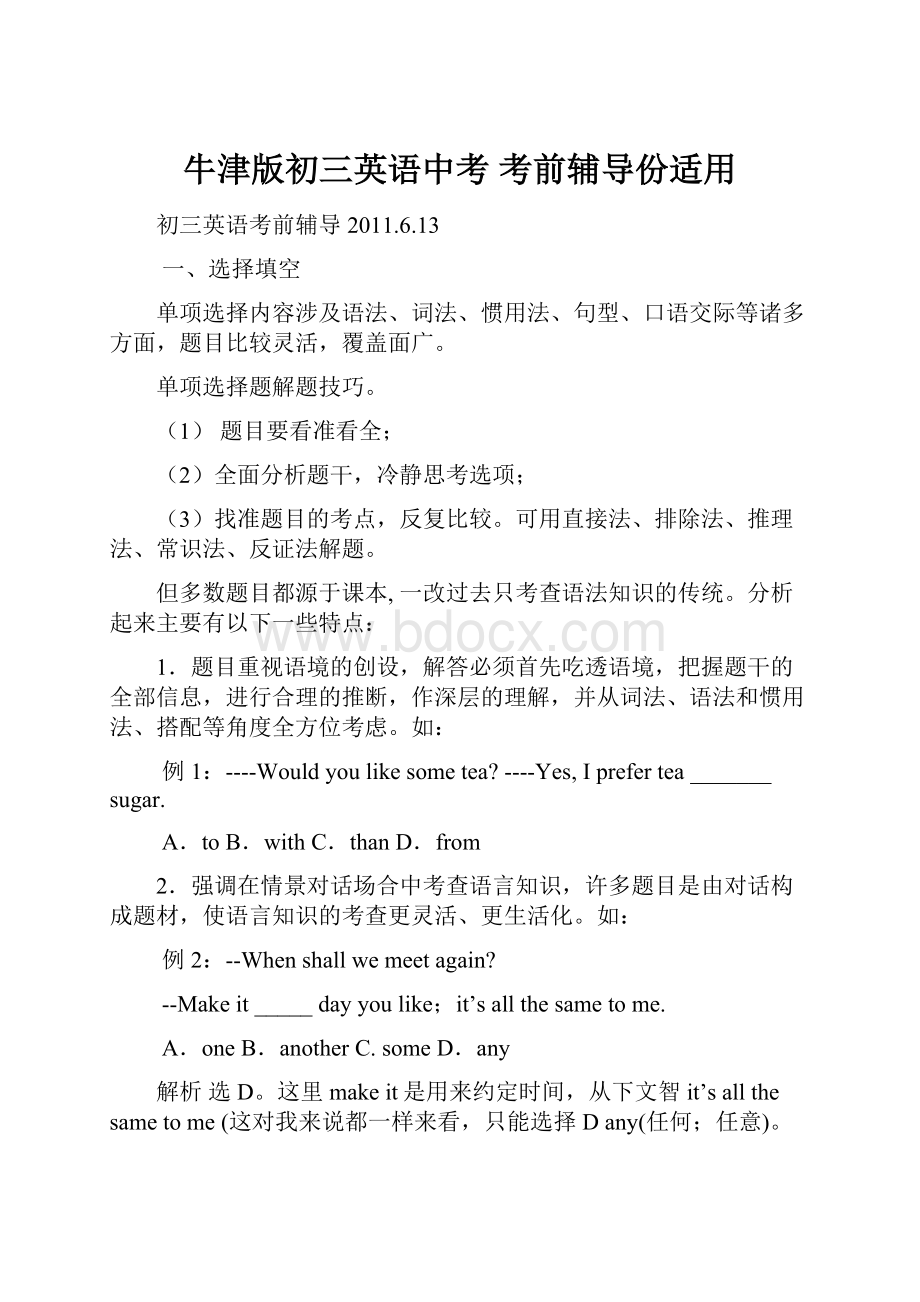牛津版初三英语中考 考前辅导份适用.docx
《牛津版初三英语中考 考前辅导份适用.docx》由会员分享,可在线阅读,更多相关《牛津版初三英语中考 考前辅导份适用.docx(37页珍藏版)》请在冰豆网上搜索。

牛津版初三英语中考考前辅导份适用
初三英语考前辅导2011.6.13
一、选择填空
单项选择内容涉及语法、词法、惯用法、句型、口语交际等诸多方面,题目比较灵活,覆盖面广。
单项选择题解题技巧。
(1)题目要看准看全;
(2)全面分析题干,冷静思考选项;
(3)找准题目的考点,反复比较。
可用直接法、排除法、推理法、常识法、反证法解题。
但多数题目都源于课本,一改过去只考查语法知识的传统。
分析起来主要有以下一些特点:
1.题目重视语境的创设,解答必须首先吃透语境,把握题干的全部信息,进行合理的推断,作深层的理解,并从词法、语法和惯用法、搭配等角度全方位考虑。
如:
例1:
----Wouldyoulikesometea?
----Yes,Iprefertea_______sugar.
A.toB.withC.thanD.from
2.强调在情景对话场合中考查语言知识,许多题目是由对话构成题材,使语言知识的考查更灵活、更生活化。
如:
例2:
--Whenshallwemeetagain?
--Makeit_____dayyoulike;it’sallthesametome.
A.oneB.anotherC.someD.any
解析选D。
这里makeit是用来约定时间,从下文智it’sallthesametome(这对我来说都一样来看,只能选择Dany(任何;任意)。
3.题目命题时注重干扰和迷惑,通过各种手段考查综合运用语言的能力。
如:
例3TheschoolsinChinaaredifferentfrom_____.
A.AmericaschoolsB.thatofAmerica
C.America.D.thoseinAmerica
解析选D。
考查‘‘比较级要在同类事物之间进行比较”和“替代”(theschools用those来代替)。
做题时容易受汉语的习惯思维定势的影响误选C,题目的迷惑性很大。
4.题目的综合性增强,同时考查两个或两个以上的知识点;有些题目设计了两个或两个以上的空格;有些题目虽然只有一个空格,但涉及多个考点。
如:
例4:
Idon’tknowifit_____tomorrow.Ifit_____,Iwon’tgo.
A.willrain;rainsB.willrain;willrain
C.rams;rainsD.rains;willrain
解析选A。
这里考查了if引导宾语从句和条件状语从句两种不同的用法。
前面一句中的if引导的是宾语从句,由于主句的时态是现在时态,因此宾语从句根据需要用一般将来时,而后一句if引导的条件是状语从句,因主句是一般将来时,从句只能用一般现在时。
所以做题时要看清题干,注意常用的语法现象,语言环境和习惯用语,常采用择优法,排除法、比较法、运用逻辑推理法、固定结构判断法。
在做题的过程中,务必看清句子的干扰项。
1.冠词:
字母(单词)里以元音开头的,如表示一个(件、只……)则用“an”an“f(l,m,n,s,x,a,e,i,o,r,h)”anhouranorangeanhonestboy
aneight-year-oldboyaneleven-metre-wideriveranunusualday
字母(单词)中以辅音开头的,如表示一个(件……)则用a“u”
asecondtime(再/又一次)athirdchance(又一次机会)
ausefulbookauniversityaone-eyedcat
2.名词:
theGreenfamily==theGreens(注意谓语动词)
class
theelderly/young/old/rich/poor/police/audience
e.g.Hisfamilyarehavingsupperinthediningroomnow.
TheGreenfamilyhasmovedtoParis.
twomonths/years
20dollars(表示、数学运算、重量、金钱、距离、时间、数目等复数名
10meters词或短语做主语看作一整体,注意谓语动词用单数)
e.g.TwoMonthshaspassedsincehecamehere.
thenumberof
anumberof(使用谓语动词的区别)
几分之几的…
百分之几的
mostof…(谓语动词取决于它们后面所跟的主体名词或代词)
e.g.
1)Threefifthsofthemoneyismine.
2)89%ofthestudentsarefromcities.
3)Abouttwothirdsoftheearthiscoveredwithwater.
4)Alotofworkhasbeendonebyhersinceyesterday.
5)MorethanonepersonhasbeentoBeijing.
主语为单数,且后面跟有with,togetherwith,alongwith,besides,except,like,aswellas,especially等,谓语动词用单数
e.g.Themanager,alongwithhissecretary,isgoingtothemeetingroom.
名词所有格:
Jim’stwomonths’(two-month)holidaysomeoneelse’swhoelse’s
TomandJack’sroomeachother’sothers’
Tom’sandJack’sroomsIt’s15minutes’walk.
spend/haveatwo-weekholidayIt’sa15-minutewalk.
spend/havetwoweeks’holidayIt’s15minutesonfoot.
havetwoweeksoff休息两周
inafewyears’(days’months’weeks’)time
inafewyears/days/months/weeks
3.代词:
注意人称代词的主、宾格、形、名词性物主代词以及不定代词。
a)one…theother(twothree…)
some…others
another
b)somelittlefewabit
anyalittleafewalittlebit
abitof+n.
something,nothinganything(可用于肯定句,作“任何东西/人”讲)
somebody,nobody,anybody
e.g.1)There’snothingseriouswithyou.
2)Ihavenothingelsenewtotellyou.
bothalleither
neithernoneeach
(注:
形容词修饰不定代词位置后置,else修饰疑问代、副词,不定代词位置后置)
c)onbothsidesofthestreet/river
oneithersideof
oneachsideof
oneveryside/allsidesofthelake/playground/island/classroom
ontheothersideof
notonly…butalso
d)neither…nor
either…or(谓语动词用就近的原则)
therebe
both…and(连接主语时谓语动词用复数)
4.数词:
a)数词的读法1,000,000,000
billionmillionthousand
一万tenthousand一亿onehundredmillion10亿1billion
b)数词的表达法概数hundredsofthousandsofmillionsof
manythousandsof
确数threemillionseveralhundredsof/severalhundred
twothousandoftheworkers
c)分数的表达法:
分子用基数,分母用序数,分子大于1,分母的序数词加s,分数后跟名词,谓语动词依据名词形式而定。
d)twoandahalfdays=twodaysandahalf
oneortwohours
固定词组
inhisfortiesnineninthsthefirstlesson
onhisfortiethbirthdayintheeighthcenturyLessonOne
attgeageoffortyinthe1970sina1970sstyle
100onehundred1000onethousand10,000tenthousand
100,000onehundredthousand1,000,000onemillion
1,000,000,000onebillion
101,101,101onehundredandonemillion,onehundredandonethousand,onehuneredandone
fivehundredtouristsmanyhundreds/thousands/millions/billionsofstudents
fivehundredofthetouristsseveralhundred/thousand/million/billionstudents
expecttodosth.
5.动词expectsbtodosth.
a)同义词辨析takelookforhearhope
bringfindlistenwish
(肯、否)mustseesearchsb.risevi.
talkhavetolooksearchforsb.raisevt.
sayarrivein/atstealsth.fromsearch+place+forsb./sth.
speakreachrobsb.ofsth.searchtheInternet
tellgettograbsth.searchtheinformationontheInternet
usedtodobemadeof/fromreturnsometimes
beusedtodoingbemadeinlendsometimes
beusedtodobemadebyborrowsometime
beusedfordoingbemadeupofkeepsometime
beusedby
beusedin
()1.Whatdidtheteacher______youto______atthemeeting?
A.tell,sayB.ask,speakC.tell,speakD.ask,talk
()2.Doyouknowwhothey’re_____abouttheaccidentattheschoolgate?
A.talkingB.sayingC.tellingD.speaking
3.WhatdoyoucallthisbirdinEnglish?
b)动词短语puton
动副结构:
putup
turnon/offtryonkeepoffputawaythrowabout
turnup/downkeepawayfromputofflitterabout
giveuplookup(inthedictionary)putdownringup
giveoutlookdownon/uponputoutthefiregooverpickup
giveawaylookoverthinkoverwakeup
takeinworkout
takeoff
takeaway
takeoutof
动介结构:
geton(off),lookfor,workon,falloff,
complainabout,talkabout,thinkabout
c)感官、使役动词
seemake
hearsbdo(doingsth)letsbdosth
wacthhave改为被动语态要加“to”
noticehelp
注意被动语态made
seensb.belettodo
sb.beheardtodohad
watchedhelped
noticed
seen
sb.behearddoing
watched
noticed
e.g.Theworkersmakemachinestohelpfarmers.
d)情态动词:
注意may,must,should,oughtto,must的否定答语,注意语境,
may的否定回答maynot/can’t/mustn’t/ofcoursenot(看语境)
表猜测用情态动词may,must,
maybe,mustbe——can’tbe
need作行为动词用needtodo(否定句、疑问句中要用助动词)
needdoing=needtobedone
MustI/we…?
否定回答No,youneedn’t/don’thaveto.
Sb.needn’tdo…
区别can
beableto
e)非延续性动词→延续性动词
borrow---keepbuy---haveopen---beopendie---bedead
come(go)---beinleave---beaway(from)begin---beon
join---bein(amember)begin(start)todo---dogetup---beup
makefriends---befriendscomeback---beback
fallasleep---beasleepcatchacold---haveacold
gettoknow---knowget(receive)aletterfrom---havealetterfrom
becomeinterestedin---beinterestedinwake---beawake
getmarriedto---bemarriedto
6.介词
a)注意inonatwith的用法(注意时间、地点)
b)比较betweeninover(under)
amongafterabove(below)walkpast/by
through(desert,forest,door,tunnel,window)withoutpast
across(bridge,street,road,river)withbeyond
Theplaneflewacrosstherainforest.
c)含有一些介词的短语
connect…to/withjoin…tocontact…on
avisittoakeytoanentranceto
thewaytoatriptoawitnessto
comeupwithcatchupwithplayagainst(with)
bybike=onabikeinredinthetreeonthetree
intheendattheendofbytheendof
towardstothereasonforthecauseof
7.反意问句
a)注意陈述句中有hardly,never,few,little,seldom,nothing,none,neither,nobody,no等词,反意问句用肯定的形式。
b)注意主语后面的’s(is,has)’d(had是实意动词还是助动词))
c)I/Webelieve,I/Wethink,I/Wesuppose后面跟宾语从句,如是否定句,否定前移。
反意问句,看宾语从句。
d)unusual,unhappy,impossible,dislike,unfair等前缀的反义词,反意问句仍用否定形式。
e)mustbe表推测,看must后面的动词
注:
前否后肯反意问句的回答
Let’s……,shallwe?
其余用willyou?
----Didn’thecometoschoolyesterday?
----____,thoughhedidn’tfeelwell.
----It’snothingserious,_______,doctor?
----____,you’dbetterstayinhospitalandyouneedanoperationatonce.
8.同义词辨析
solonelybeforelongwhenpleasedeither
suchalonelongbeforewhilepleasanttoo
pleasurealso
aswell
注意区别
closehighwidehard
closelyhighlywidelyhardly
9.特殊疑问词
a)对人口、电话号码,地址,省会,首都,价格,用特殊疑问词what(whatplace…visit)
对人的职业用Whatbesb.(Whatishe?
)
对人的相貌用what…looklike或whatbelike(Whatdoeshelooklike?
)
对人的品质用what…belike(Whatishelike?
)
b)howsoon(often,faraway,long)
10.情景对话
看清上下文,注意说话的环境、对象。
11.非谓语动词
a)动名词
feellikedoingfinishdoingenjoydoingminddoing
practicedoingmissdoingsuggestdoingimaginesbdoingsth
devote…todoingsthlookforwardtodoingpayattentiontodoing
beusedtodoingcan’thelp/stopdoinginsistondoing
bewellworthdoingbebusydoingputoffdoing
stopsbfromdoingkeepsbfromdoingpreventsbfromdoing
considerdonghatedoingforget/rememberdoing
meandoingstanddoingforgivesb.fordoingsth.
(sbsth带有被动的意味;用stop/preventsbbeingdone)
keepondoingcarryondoinggoondoing
beusedfordoingthanksbfordoing
havefunhavenotimetodosth
problemsdoing没时间做某事
difficulty
trouble
agood/great/wonderfultime
needdoing==needtobedonerequiredoing
giveupdoing==dropdoing
spend…(in)doingsucceedindoingpreferdoingtodoing
注意区别:
stop,forget,goon,remember,see(hear,watch),doingsth和todosth分词作定语,伴随状语
b)动词的不定式
decidetodo,failtodo,wouldliketodo,wanttodo
trytodo,affordtodo,offertodo,usedtodo,beusedtodo
begin(start)todo,needtodosth,plantodo,prefertodo,
can’twaittodo,makeupone’smindtodo,advisesbtodo
warnsbnottodopromise(sb)todo
allowsbtodo,encouragesbtodo,expectsbtodosth,
remindsbtodosth(remindsbofsth)ask(tell)sbtodo,
apentowritewith,theicetoskateon,thespacetostandin,
aplacetogoto,whichcitiestotraveltoifI’mableto/ifI’mtoldto
I’mgladto...I’dloveto…(to不能省)
注意下列句子:
1.Weshoulddowhatwecantoprotecttheenvironment.
2.Hespentas